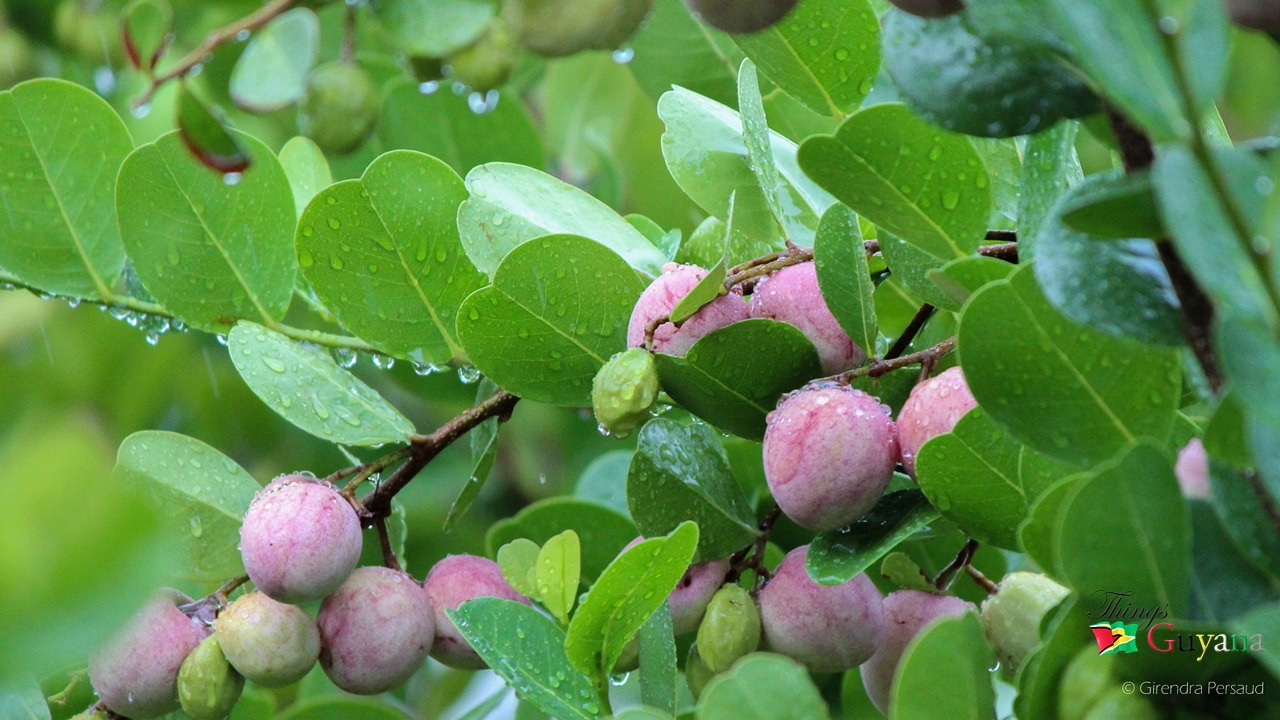Fat Pork or Fat Poke as Guyanese would call it is a delicate, fleshy fruit found in the sandy parts of Guyana. While Fat Poke is a nontraditional name it is also the common name by which many Guyanese know it. In other countries, Fat Poke is also known as the abajeru, coco plum, paradise plum, hog plum, and icaco. However, the scientific name for this fruit is Chrysobalanus icaco. The soft, slightly sweet flesh of this fruit distinguishes Fat Poke from any other plum fruits. The aesthetic hues of pinks and red combined with the green of its leaves makes the little clusters of Fat Poke a captivating sight and an even tastier morsel. This tropical fruit never cease to amaze whether it’s made into jams or even eaten fresh from the tree.

Fat Poke – Photo by Girendra Persaud
Origin of Fat Poke
Fake Poke or Chrysobalanus icaco is native to the tropical parts of the Americas and Africa. It also grows in Mexico, countries in South America, like Guyana and Brazil, the Caribbean, the Bahamas and even southern Florida in the United States of America.
Description of Fat Poke
Chrysobalanus icaco or Fat Poke grow on small shrubs or trees about four (4) to six (6) metres tall and typically growes in humid, lowland tropics. The leaves are evergreen, somewhat leathery in texture and ranges in colours from green to light red. Sizes are about about three (3) to ten (10) cm long and two point five (2.5) to seven (7) cm wide. The flowers are small, greenish-white. Fat Poke fruits are considered drupes because they are fleshy with a thin skin containing the seed.
Scientific Classification Of Fat Poke
- Kingdom: Plantae
- Clade: Tracheophytes
- Clade: Angiosperms
- Clade: Eudicots
- Clade: Rosids
- Order: Malpighiales
- Family: Chrysobalanaceae
- Genus: Chrysobalanus
- Species: C. icaco
Traditional Uses of Fat Poke
- The bark, fruit, root, and leaves are astringent and all contain tannin.
- They are also used to treatment diarrhoea, dysentery and dyspepsia.
- Externally they are used as a wash to treat skin complaints.
- When mixed with oil, the juice of the roots and leaves help to stimulate virginity in women and treats flaccid scrotum in males.
Culinary Uses of Fat Poke
- The sweet, white, spongy fruits are typically eaten raw but can be made into jams and jellies.
- Fruits can also be dried like prunes or stewed in a sugar mixture.
- Seeds can be roasted and eaten and an edible oil can be extracted from them.
- The kernel of Fat Pork seeds are ground into a powder, dried and used as the spice, “gbafilo” or “itsekiri” in a West African Pepper Soup Mix.
Other Uses of Fat Poke
- Chrysobalanus icaco plants make great hedges, especially by the sea.
- Plants can also stabilize sand dunes since they form impenetrable thickets.
- Fat Poke seeds are so enriched with oil that they can be strung on sticks and burnt like a candles.
- A dark dye can be obtained from the fruits and leaves.
Health Benefits of Fat Poke
- Improves Vision – These plums are packed with beta-carotenene and Vitamin A which are great for improving your vision and also the cornea from the harmful Ultraviolent (UV) rays.
- Builds Membrane – Lipoprotein helps to build and sustain cell membranes, prevents the development of hypercholesterolemia and improve the signals of cells in the body.
- Fights Cancer– Fat Poke is the best fruit to combat cancer due to a susbstance called epicatechin that helps slows down cell growth of cancer. In addition they are full of antioxidants, chlorogenic acid, and phytonutrients.
- Protects against Heart Attack –Chrysobalanus icaco reduces risk of strokes and treat atherosclerosis as well boost blood fluidity which in turn decreases the risk of heart attack.
- Improves Skin – Just like any other fruits, Fat Poke contains Vitamin C and antioxidants which help in skin health. Eating this fruit can acne and heal dark spots.
- Healthy Bones – This fruit contains Vitamin K that is important in correcting weak bones and keeping bones healthy in the body.
About Fat Poke
Fat Poke is a delicious fruit that can be enjoyed fresh, made into scrumptious jams and jellies or stewed in sugar. While it doesn’t grow just anywhere you can find these trees growing along the sea on beaches. These fruits can be found all across Guyana and are prized for their soft texture, sweetness. Not only are they delicious but healthy too! Eating Fat Poke or paradise plums helps to promote skin and eye health among other magnificent health benefits.
Article References
- https://pfaf.org/user/Plant.aspx?LatinName=Chrysobalanus+icaco
- https://en.wikipedia.org/wiki/Chrysobalanus_icaco
- http://wiwords.com/word/fat-pork
- https://www.britannica.com/plant/coco-plum
- http://tropical.theferns.info/viewtropical.php?id=Chrysobalanus+icaco
- https://www.healthbenefitstimes.com/cocoplum/






